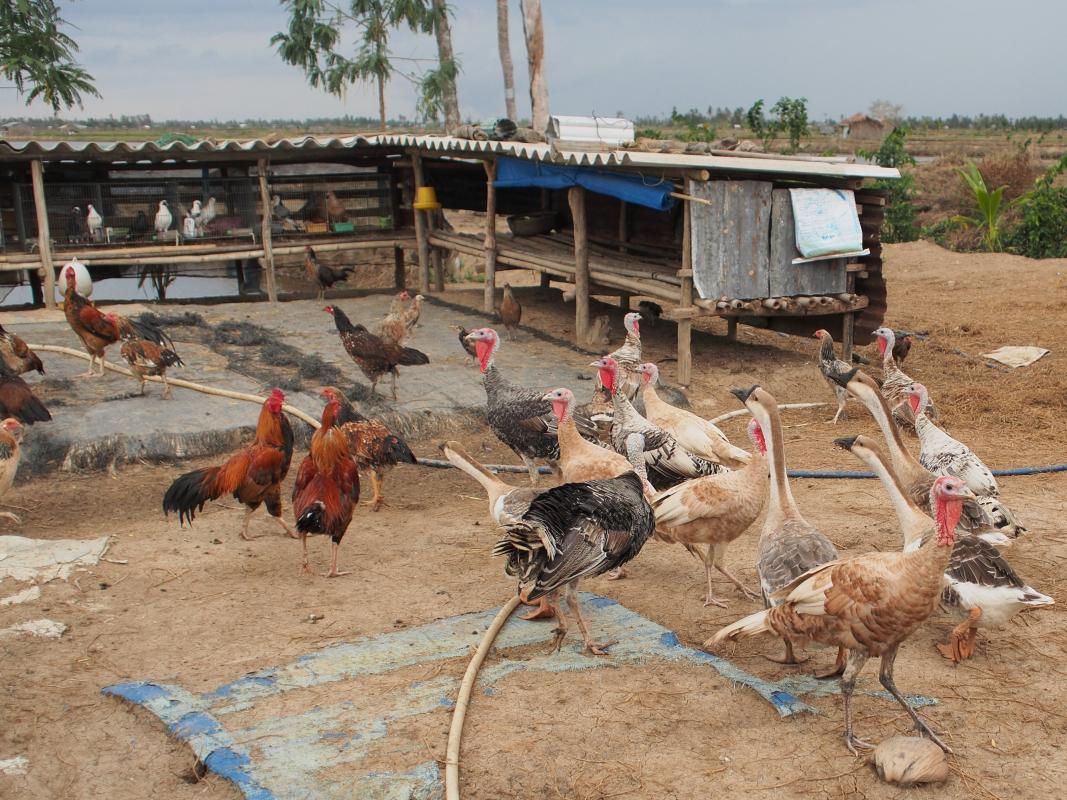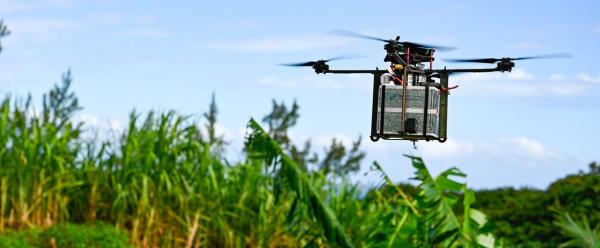Results & impact 10 October 2025
- Home
- Press area
- Press releases
- avian influenza poultry farming Mekong
In Vietnam, the quick sale of poultry in response to avian diseases may increase deadly virus transmission

Small-scale livestock farms require little investment and are an additional source of income for rural households. The local races or crossbreeds used on such farms are popular with consumers © Maciej Boni, University of Pennsylvania (USA)
Small-scale aviculture (poultry farming) is practised by millions of Vietnamese households, and by millions of other rural families across Southeast Asia. The size of these operations is typically no more than 100 birds per farm. These farmers make decisions on a daily basis – often in response to economic incentives – about when and where to sell their flocks. Their decisions can influence the spread of diseases, especially avian influenza.
“Avian influenza can be deadly to humans, with a case fatality rate between 25% and 50% ”, says Maciej Boni, Professor of Biology at the University of Pennsylvania in the USA. “Fortunately, reports of human-to-human transmission over the past 15 years have been either absent or anecdotal. Covid-19 took us by surprise, but with HPAI we have a known threat with the potential to become pandemic. If we ignore the active role that poultry farmers play in the control and dissemination of avian influenza, we may miss another opportunity to curtail an emerging disease outbreak at a stage when it is still controllable. ”
The role of poultry farmers’ behaviour in the spread of avian diseases
Maciej Boni and his team, including researchers at the Oxford University Clinical Research Unit (OUCRU) in Ho Chi Minh City, conducted a study of small-scale poultry farms in the Mekong River delta region in southern Vietnam. The goal was to characterize the effects of disease outbreaks on poultry sale and slaughter rates, as well as on two practices aimed at preventing avian diseases: vaccination and the disinfection of buildings and equipment. The team monitored 53 farmers and their management of more than 1000 poultry flocks over a period of two years, from 2015 to 2017.
Lead author Alexis Delabouglise, an animal health economist at CIRAD who was a postdoctoral student at the University of Pennsylvania when the study was conducted, established statistical analyses to model the likelihood of selling or slaughtering flocks, of performing avian influenza vaccination on flocks that were not previously vaccinated, and of disinfecting farm facilities when faced with an outbreak.
“If there is an outbreak on a neighbouring farm, farmers might choose to sell their poultry early to avoid their own birds being infected and to avoid lower prices ”, says the researcher. “And if there is an outbreak on their own farm, the evidence in our study shows that they would be likely to sell their birds early to minimize both financial losses and epidemiological risk. ”
“We found that farmers send their chickens to market early when outbreaks occur on their farms ”, says Alexis Delabouglise. “Specifically, the likelihood of small-scale farmers selling their poultry increases by 56% during outbreaks with no sudden deaths, and by 214% during outbreaks with sudden deaths. This has the potential to exacerbate the outbreak and spread the virus even further. ”
Finally, the scientists found that the likelihood of vaccination against avian influenza strongly increased with flock size. The probability of vaccination was almost zero for flocks of 16 birds or fewer and nearly 100% for flocks of more than 200 birds. According to Alexis Delabouglise, one reason that millions of small-scale poultry farmers may not be vaccinating their birds could be the labour required to carry out this vaccination, as well as the obligation to declare flocks to government veterinary services prior to vaccination. Another reason could be that due to their small production size, their vaccination status is not controlled and vaccination is therefore less worthwhile.
“Crucially, it is these smaller flocks that are more likely to be sold into trading networks during outbreaks ”, says the researcher. “The rapid sale of sick birds can contaminate other birds at traders’ storage places and those at live bird markets. It also exposes consumers and traders, slaughterers and retailers to an increased risk of infection. ”
Alexis Delabouglise notes that, on the flip side, a massive arrival of underage birds in a live bird market, or a price decrease due to the temporary oversupply of poultry, may be a sign that an outbreak is occurring.
“This is an interesting area for surveillance of livestock diseases ”, he says.
Offering alternatives to small-scale poultry farmers
The team’s findings could help government agencies to develop policies aimed at avoiding the spread of HPAI.
“Small-scale farmers could play an active role in the control of emerging infectious diseases if they are given the opportunity to depopulate their farm upon disease detection without disseminating pathogens in trade circuits ”, says Alexis Delabouglise. “Policymakers could encourage the establishment of formal trade agreements that foster such ‘virtuous’ management of disease outbreaks in poultry. ”
One such “virtuous” management strategy could be for farmers to sell their sick chickens as feed for pythons and crocodiles raised on neighbouring farms. Another could be to set up agreements with large commercial farms in their vicinity, which could give them financial compensation to destroy the birds and dispose of their carcasses as a way of protecting their own flocks.
“It would be impossible to have reliable public-health control over the millions of small-scale poultry flocks in a country like Vietnam ”, says Alexis Delabouglise, “but providing economic incentives to responsibly manage birds during disease outbreaks is feasible ”.
The Defense Threats Reduction Agency, Wellcome Trust and Pennsylvania State University supported this research.
Delabouglise, Alexis, Nguyen Thi Le Thanh, Huynh Thi Ai Xuyen, Benjamin Nguyen-Van-Yen, Phung Ngoc Tuyet, Ha Minh Lam, Maciej F Boni. 2020. Poultry farmer response to disease outbreaks in smallholder farming systems in southern Vietnam . eLife



























